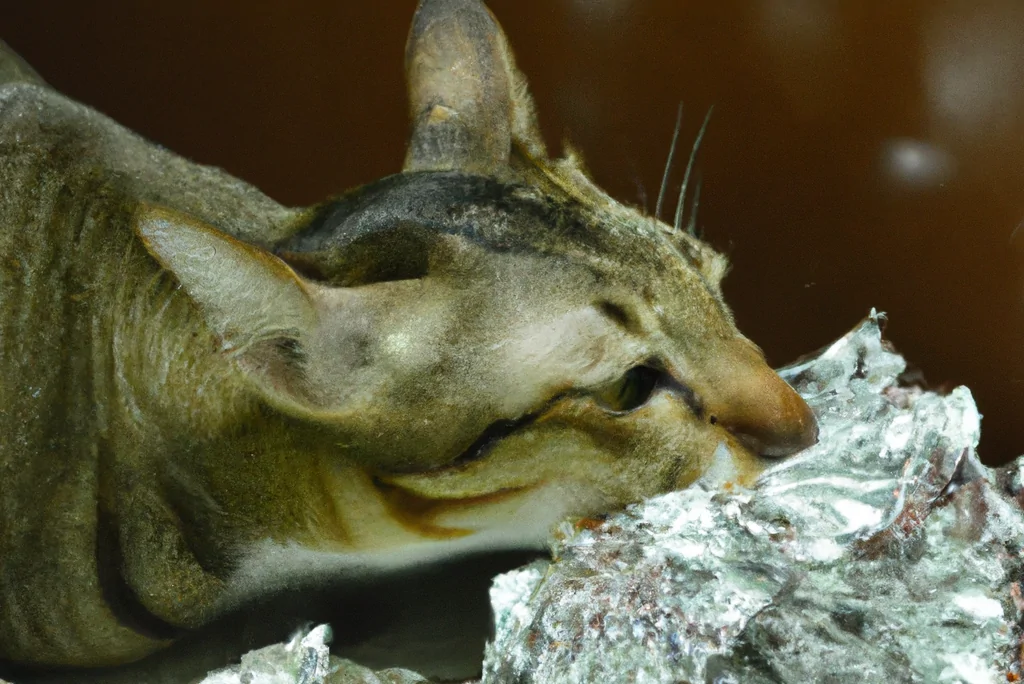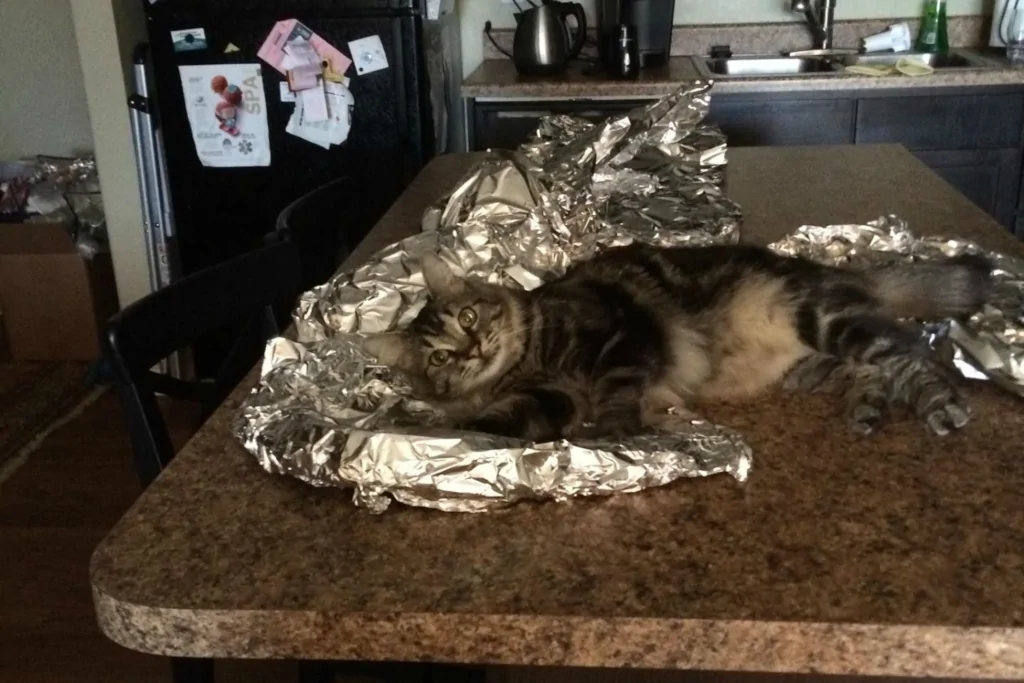Disclosure: We may earn a commission from helpful, relevant links in our content. No cost to you. See our privacy policy.
Discovering your feline friend has feasted on aluminum foil can spark concern and panic, as you worry about the potential health risks and consequences.
You may find yourself questioning the toxicity of aluminum foil and the urgency of the situation.
As a fellow cat parent, I understand your worry, and I’m here to guide you through this nerve-wracking experience.
In this blog post, we’ll explore the effects of aluminum foil ingestion in cats, the signs to watch for, and the best course of action to take. Together, we’ll unravel the mystery of aluminum foil and your cat’s insatiable curiosity.

What Happens if a Cat Eats Aluminum Foil?
If a cat eats aluminum foil, it could cause discomfort and potential health issues.
In most cases, small amounts of foil may pass through their digestive system without causing harm. However, larger pieces could lead to blockages, requiring veterinary attention.
Keep a close eye on your cat’s behavior and monitor for any signs of distress.
Can Aluminum Foil Be Toxic to Cats?
Aluminum foil itself is not toxic to cats. The real concern lies in the possibility of intestinal blockages and complications.
It’s crucial to recognize the warning signs of foil ingestion and take appropriate action to ensure your cat’s safety and well-being.
Signs Your Cat May Have Ingested Aluminum Foil
If you suspect your cat has ingested aluminum foil, look for the following signs:
- Vomiting. Your cat may vomit the foil, or vomit due to discomfort caused by the ingested foil.
- Loss of appetite. If your cat suddenly shows disinterest in food, it could be a sign of a blockage.
- Lethargy. A lack of energy or increased sleepiness may indicate discomfort or pain.
- Straining to defecate. If your cat is having difficulty passing stool, it could be due to an obstruction.
- Abdominal pain or swelling. A tender, swollen belly may be a sign of an intestinal blockage.
Being aware of these signs can help you take prompt action to ensure your cat’s safety and well-being.
What to Do if Your Cat Ate Aluminum Foil
If you think your cat has eaten aluminum foil, follow these steps:
- Stay calm. Panicking will only stress both you and your cat. Stay composed and focused on the situation.
- Assess the situation. Determine how much foil your cat may have ingested, and monitor their behavior for any concerning signs.
- Contact your veterinarian. Even if your cat seems fine, it’s best to consult with your vet, as they can provide guidance and recommend whether you need to bring your cat in for an examination.
- Keep an eye on your cat. Monitor your cat closely for any changes in behavior or signs of distress. If any severe symptoms emerge, seek immediate veterinary attention.
- Follow your veterinarian’s advice. If your vet recommends bringing your cat in for an examination or treatment, follow their instructions to ensure the best possible outcome for your feline friend.

How to Prevent Cats From Eating Aluminum Foil
To keep your feline friend from indulging in aluminum foil, there are several practical measures you can take.
Start by storing aluminum foil securely in a drawer, cabinet, or other location that your cat cannot access.
When disposing of used foil, always place it in a covered trash can to minimize the chances of your cat discovering it.
If your cat is particularly attracted to foil, consider using alternatives like parchment paper or silicone baking mats for your cooking and food storage needs. We were really blown away by this excellent Amazon Basics baking mat that has about 100K positive ratings on Amazon.
Ensuring your cat has plenty of toys and engaging activities can help keep them entertained and less likely to seek out non-food items like foil.
Finally, it’s essential to monitor your cat’s environment, regularly checking your living space for stray pieces of foil that may have been accidentally dropped or left behind.
By taking these steps, you can create a safer environment for your curious cat.
FAQS
How long does it take for aluminum foil to pass through a cat’s system?
It typically takes 24 to 48 hours for an ingested object to pass through a cat’s system. However, this may vary depending on the size of the object and the individual cat. According to San Bruno Pet Hospital, some objects can take months to pass, if they are too big.
Can a cat choke on aluminum foil?
Yes, a cat can potentially choke on aluminum foil if it becomes lodged in their throat, posing a serious choking hazard.
Should I induce vomiting if my cat ate aluminum foil?
No, you should not induce vomiting if your cat ate aluminum foil, as it can cause more harm. Instead, consult your veterinarian for guidance on the appropriate course of action.
What items are commonly mistaken for aluminum foil by cats?
Cats may mistake items like plastic wrap, cellophane, and other shiny or crinkly materials for aluminum foil due to their similar appearance and texture.
Alex, a passionate animal lover, has experience in training and understanding animal behavior. As a proud pet parent to two dogs and three cats, he founded AnimalReport.net to share insights from animal experts and expand his knowledge of the animal kingdom.




